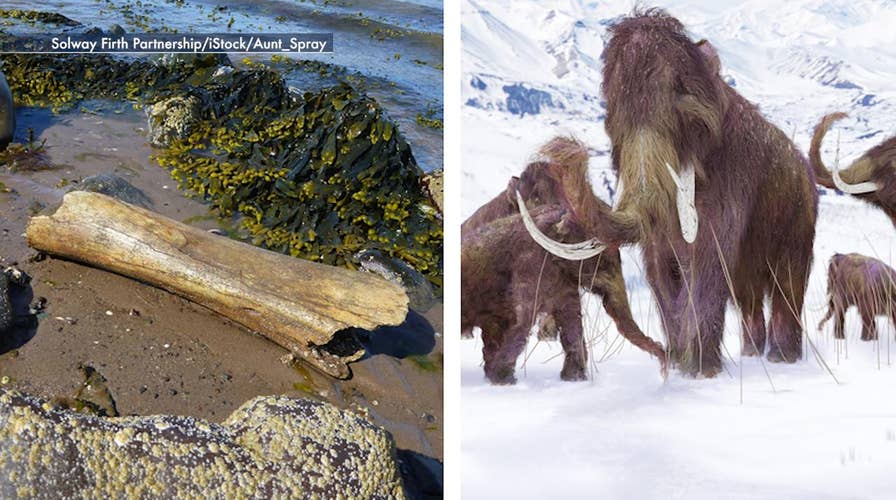Road workers expanding the A14 highway in England have uncovered woolly mammoth bones believed to be 130,000 years old, with some calling it a "remarkable find."
The bones were found between Cambridge and Huntingdon, Cambs, by Highways England workers, according to SWNS. In addition to the mammoth bones, they also found woolly rhino remains, both of which are set to be looked at by researchers to determine their exact age.
"The remains of a woolly mammoth dating back to the Ice Age are among the latest remarkable finds from the team working on the A14 Cambridge to Huntingdon project," a Highways England spokesman said, according to SWNS.
SCIENTISTS WANT TO CLONE THIS EXTINCT, FROZEN PREHISTORIC HORSE

A prehistoric Rhino skull. Remains of an ancient woolly mammoth believed to be 130,000 years old were dug up by road workers expanding a motorway. (Credit: SWNS)
It is believed that the area where the bones were found was an ancient river.
Paleontologist Dean Lomax said the discoveries were exciting but wondered whether the area has more to be uncovered.
"Woolly mammoth and woolly rhino were once a common part of the wildlife here in the UK, during the Ice Age," Lomax said, according to SWNS. "However, recent discoveries like this are quite uncommon and it is exciting that they have been uncovered during road works. It would be interesting to discover whether this is a one-off discovery or whether more individuals are preserved in the same area."

Highways England worker with a Mammoth bone. Remains of an ancient woolly mammoth believed to be 130,000 years old were dug up by road workers expanding a motorway. (Credit: SWNS)
Lomax continued: "It is also important that these specimens are appropriately cared for and conserved. These types of bone, especially mammoth tusk, can deteriorate quite poorly if left untreated so great care should be taken with these remains."
Woolly mammoths went extinct more than 4,000 years ago, with some scientists believing they died off from the changing climate and human hunters.
CAN THE LONG-EXTINCT WOOLLY MAMMOTH BE CLONED?
However, researchers are attempting to bring back the mammoth with the use of gene editing, including the controversial CRISPR gene editing tool.
George Church, a Harvard and MIT geneticist and co-founder of CRISPR is the head of the Harvard Woolly Mammoth Revival team, a project that is in attempting to introduce mammoth genes into the Asian elephant for conservation purposes.
"The elephants that lived in the past — and elephants possibly in the future — knocked down trees and allowed the cold air to hit the ground and keep the cold in the winter, and they helped the grass grow and reflect the sunlight in the summer," Church told Live Science in May. "Those two [factors] combined could result in a huge cooling of the soil and a rich ecosystem."
EXTREMELY RARE WOOLLY MAMMOTH BONE FOUND ON BEACH
Mammoth remains have been found all over the globe in recent months. In June, a mysterious mammoth bone was found on a beach in Loch Ryan in southwest Scotland.
In August, a frozen woolly mammoth was found in Siberia, with researchers theorizing that it may be a new type of species, because of its small stature. It has been dubbed a "Golden mammoth" and could be as much as 50,000 years old.
In September, a mammoth kill site was found in Austria, where Stone Age people slaughtered mammoths.
Fox News' James Rogers contributed to this report. Follow Chris Ciaccia on Twitter @Chris_Ciaccia

